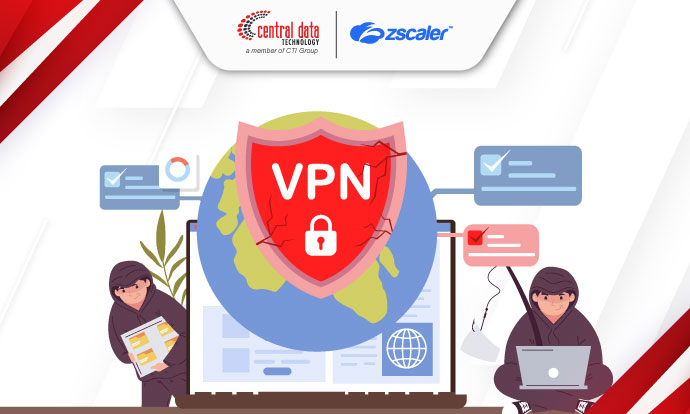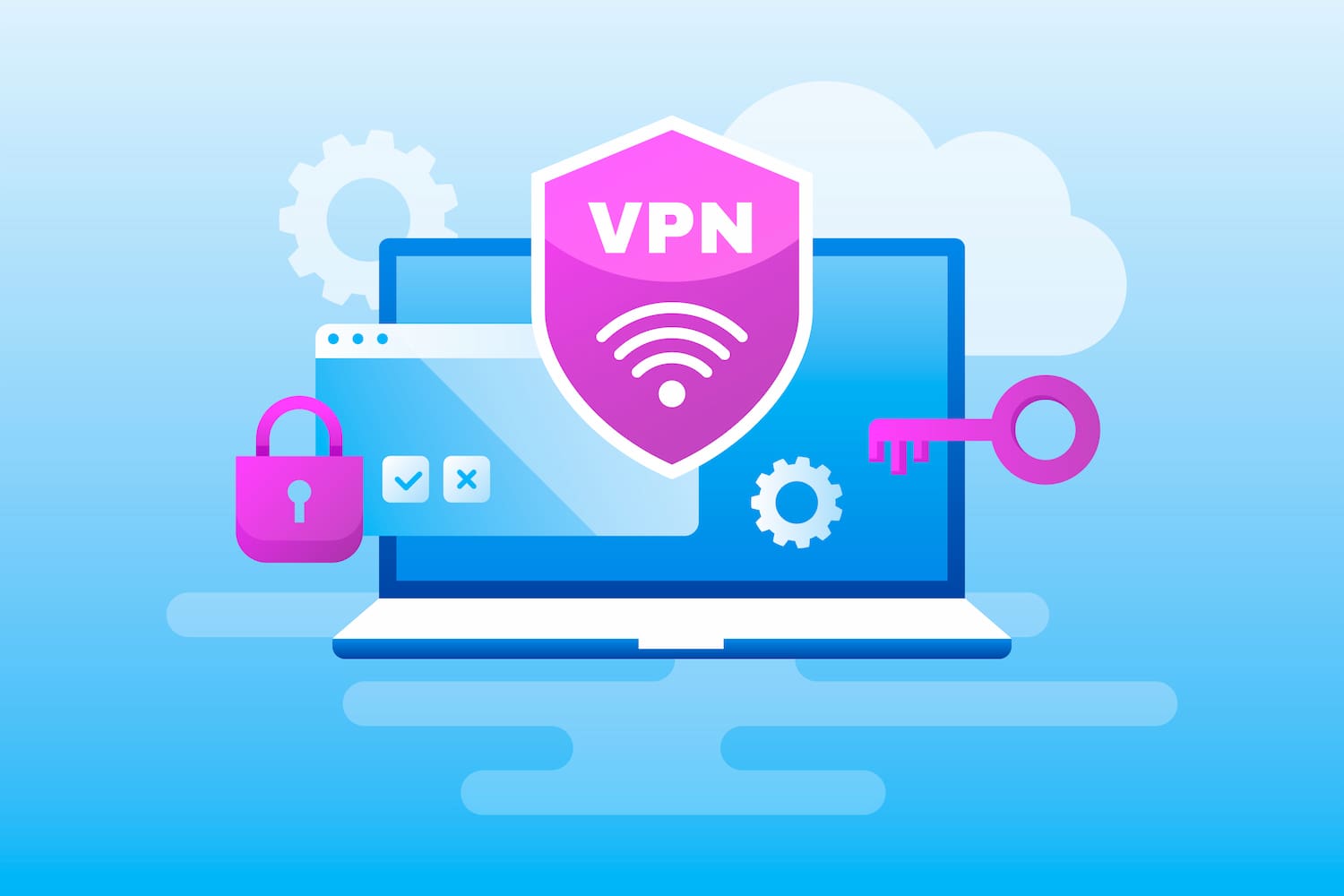
VPNs (Virtual Private Networks) have become a popular choice for those who want to browse the digital world safely and freely. Compared to using a regular Internet connection, a VPN provides users with a secure tunnel that encrypts Internet traffic, allowing them to browse anonymously. However, in a digital age full of cyber threats, the effectiveness of VPNs in addressing security concerns is increasingly being questioned. In fact, they may even pose risks such as leaking sensitive data. Why is this the case? Let’s discuss it below.
What is VPN?
VPN, or Virtual Private Network, is a service that provides a private network connection between multiple devices over the Internet. It enables secure and anonymous data transmission over a public network. With a VPN, the user’s IP address is hidden, and data is encrypted to protect privacy.
In simple terms, a VPN connects a device such as a smartphone, tablet, or PC to another computer (called a VPN server) in an Internet-connected location. This allows users to browse the Internet through that computer’s network while maintaining online security and privacy.
What are the Uses of VPN?

Aside from being used to securely transmit data over the Internet, a VPN has three main functions as follows.
Privacy
VPNs use encryption to protect your personal information, such as passwords, credit card information, and browsing history, from third parties who might want to record and sell it. This is especially important when connecting over public Wi-Fi networks.
Anonymity
By hiding your IP address, a VPN keeps you anonymous while you browse the Internet. This helps protect your privacy from websites that track your browsing activity.
Security
VPN uses cryptography to protect your Internet connection from unauthorized access. It can also act as a shutdown mechanism, stopping selected programs in the event of suspicious Internet activity, helping to reduce the risk of data compromise and allowing remote access for legitimate users over business networks.
How Does a VPN Work?
To understand what a VPN is, let’s understand how it works.
VPNs work by creating an encrypted tunnel within the public Internet network. The user’s device connects to an encrypted VPN server, so all Internet data sent and received is encrypted and hidden before it reaches the Internet.
In addition, the VPN also hides the user’s real IP address and replaces it with the IP address of the VPN server. This makes it appear that the user is connected to the Internet from the location of the VPN server, so the user’s data is safe from others trying to snoop or track online activity.
In short, a VPN converts all user data into random numbers, so even if someone manages to read the data, they cannot easily use the information it contains.
Types of VPNs
There are four commonly used types of VPNs, each with its own features that are worth knowing.
Personal VPN
Personal VPNs are designed for individual users and are often used to increase security when browsing the public Internet, accessing blocked content, or maintaining online privacy.
SSL VPN
Often used by organizations to allow employees to access corporate data from their personal devices. The use of SSL VPN involves access through browsers with HTML-5 support and is often implemented through dedicated devices. This allows employees to access corporate data using personal devices such as laptops, tablets or mobile phones, with the added security of usernames and passwords.
Site-to-Site VPN
This is a private network designed to hide the corporate intranet and provide secure access across multiple locations. It is typically used by large enterprises that have multiple locations with their own local area networks. Implementing a site-to-site VPN allows seamless communication between different parts of the organization, although it is more complex and less flexible than an SSL VPN.
Client to Server VPN
Allows users to connect to the corporate network from an external location, such as home. The user connects directly to the corporate VPN server, which then encrypts the data before the user accesses it. This type of VPN is often used by companies to facilitate employees working from remote locations and requires the installation and configuration of a VPN client on the user’s computer prior to use.
VPN is a Risk, is it True That It Can Leak Company Data?
VPNs are a proven network security tool, but today’s technological advancements can make companies vulnerable to data leaks. How does this happen?
Historically, VPNs were designed for work environments where users and applications were located within corporate buildings, and security focused on creating a “perimeter fence” around the network. This approach is referred to as the “castle and moat” security model.
However, with today’s changing work model, where employees can work remotely, use a variety of devices, and access cloud resources, this “perimeter fence” model is no longer effective. Corporate networks are becoming more extensive, with many potential entry points for cyber-attacks.
Here are four major drawbacks of VPNs:
- Expanded Attack Surface: Remote work models and the use of cloud computing expand corporate networks, creating many potential entry points for cyberattacks.
- Attacks are Difficult to Prevent: VPNs are not effective at stopping modern attacks or inspecting all traffic, especially encrypted traffic.
- Lateral Movement of Threats: Once inside, hackers can move freely within the internal network without the restrictions of a VPN.
- Data Leakage: VPNs are unable to prevent data leakage, which is the primary goal of hackers.
It can be concluded that VPNs are no longer sufficient to combat modern cyber threats. Businesses need to turn to more advanced and comprehensive security solutions to protect their data and systems. A solution to consider is Zero Trust Network Access (ZTNA).
Zero Trust Network Access (ZTNA), a More Secure VPN Alternative

Source: zscaler.com
Zero Trust Network Access (ZTNA) is a network security solution designed to overcome the limitations of traditional VPNs in the era of hybrid and cloud computing. ZTNA uses the Zero Trust principle to ensure that only authorized users and devices have access to network resources.
By implementing Zero Trust, businesses benefit from a global security cloud that acts as an intelligent switchboard. This enables secure connections between users, workloads, IoT/OT devices, and business partners without the need to extend the network to each entity.
In addition, Zero Trust provides a comprehensive set of solutions, including protection against cyber and data threats and the delivery of services at the edge as close to the end user as possible. On the other hand, Gartner estimates that by 2025, at least 70 percent of remote work access will use Zero Trust Network Access (ZTNA), compared to the VPN services that dominate today, with a percentage of less than 10 percent by the end of 2021.
Benefits of Zero Trust
In addition to reducing the risk of data leakage, Zero Trust offers several significant benefits, including reduced system complexity, increased user productivity, and cost savings. Here are four key benefits of implementing Zero Trust:
- Minimize the Attack Surface: Enterprises can stop unlimited network sprawl, eliminate the need for firewalls, VPNs, and public IPs, and prevent unauthorized inbound connections.
- Prevent Compromise: Can inspect all encrypted traffic at a scale to identify threats and enforce security policies in real time.
- Prevents Lateral Threat Movement: Connect users, workloads, and devices directly to the application rather than across the network. This ensures that access policies are enforced with minimal access privileges.
- Block Data Loss: Stop data loss in encrypted traffic and all other data leakage paths. This includes protection against inactive data in the cloud and data in use on employee endpoints.
Also read: Safeguarding Hybrid Work Environments with Zero Trust Security
Zscaler Private Access: Secure and Reliable Access to Private Applications
Zscaler Private Access (ZPA) is a Zero Trust Network Access (ZTNA) based network security solution from Zscaler. ZPA is designed to provide users with a direct and secure connection to private applications, whether running on-premises or in the public cloud, using the principle of least privilege.
Built on a holistic Security Service Edge (SSE) framework, ZPA delivers the following benefits:
- Better User Experience: Connect users directly to private applications, providing faster and more efficient access than traditional VPNs that require backhauling.
- Minimize Attack Surface: ZPA makes applications invisible on the Internet, preventing unauthorized users and devices from finding them. The inside-out connection between the user and the application ensures that the application and IP remain protected.
- Enforce Access with Minimum Access Rights: Access to applications is based on user identity and context, not IP address. This means users do not need to be connected to the network to access the application, increasing security.
- Prevent Lateral Movement: By segmenting applications, ZPA restricts user access to specific applications, reducing the risk of lateral movement of threats.
- Prevent Cyber Attacks with Thorough Inspection: Thorough inspection of all private application traffic prevents many common types of web attacks.
- Prevent Data Loss: Includes integrated DLP for additional private application protection, including advanced incident handling and data classification.
- Detect Compromised Users and Devices: Includes decoy technology to quickly identify and remediate malicious users and devices that have been hacked.
Enhance Network Access Security with ZPA Only at CDT
It’s time to improve network access security by moving from VPN to a more secure system, Zscaler Private Access (ZPA), which applies the concept of Zero Trust, only at Central Data Technology (CDT).
Supported by a professional, experienced, and certified IT team, CDT will also help you through the consulting, deployment, management, and after-sales support phases to eliminate trial and error. Interested in using ZPA? Contact us today by clicking the link here.
Author: Wilsa Azmalia Putri
Content Writer CTI Group

